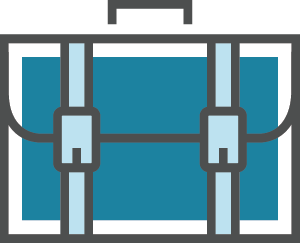The City of Peoria achieves sustainability goals with help from ASU students
By partnering with Arizona State University's Project Cities program, the City of Peoria, Arizona, was able to tackle important local and regional sustainability projects, like revitalizing its solid waste programming and adopting its Sustainability Peoria Plan.
Metrics
Community
Peoria, Arizona, USAUniversity
Arizona State UniversityProgram
Project CitiesYears
2018-2023Status
CompletedUniversity Department Code
Community Development, Engineering, Environmental and Resource Management, Justice Studies, Public Affairs, Sustainability, Technical communication, Urban PlanningSustainable Development Goals
01 No Poverty, 02 Zero Hunger, 04 Quality Education, 06 Clean Water and Sanitation, 07 Affordable and Clean Energy, 08 Decent Work and Economic Growth, 09 Industry Innovation and Infrastructure, 10 Reduced Inequalities, 11 Sustainable Cities and Communities, 12 Responsible Consumption and Production, 13 Climate Action, 14 Life Below Water, 15 Life on Land, 16 Peace Justice and Strong Institutions, 17 Partnerships for the GoalsThe City of Peoria, Arizona, is a fast growing scenic suburb of Phoenix. Named the best place to live in Arizona by Money Magazine in 2018 and the best place to live, work and play in Arizona by Ranking Arizona in 2021, the city is well-regarded for its thriving economy and exceptional school districts. Founded in 1886 as a small agricultural town, it has since grown into a city home to over 190,000 residents, who foster the city’s reputation as a “family-oriented, active community with an exceptional quality of life” (ASU Project Cities).
Respected for its strong commitment to incorporating sustainability initiatives and standards, Peoria established its Livability Initiatives to set short and long-term priorities for the community, including Superior Public Safety, Smart Growth, Economic Prosperity, Arts, Cultural & Recreational Enrichment, Integrated Transportation, Healthy Neighborhoods, and Superior Public Services (City of Peoria General Plan 2040). Peoria invited Arizona State University’s (ASU) Project Cities program for the 2019-2020 academic year to continue supporting their sustainability and livability initiatives. Project Cities, a member of the EPIC-Network, assists cities by “connecting university students, faculty and academic courses to sustainability projects prioritized by community stakeholders” (Project Cities Mission).
Improving the quality of life in and around Peoria
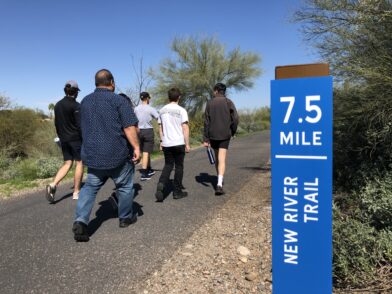
The City of Peoria partnered with Project Cities to take on municipal projects in need of assistance. What they received was over 646 students, spread across numerous courses, ready to tackle city challenges with their knowledge and expertise. Project Cities Program Manager, Steven Russell, was particularly excited about the partnership, noting the benefits ASU’s cross-disciplinary collaboration would provide to improve the quality of life of Peoria’s residents.
Russell spoke frankly about his excitement for the project and the opportunities it provided to both the city and involved students, stating:
“The students get a hands-on learning opportunity to practice professional skills by working with clients. The city gets extra capacity to move projects forward that they may not have the labor or capacity to address at the time and citizens, of course, benefit from having a more economically sustainable community.” (The State Press).
Lisa Estrada, the Economic Efficiency and Sustainability Manager of Peoria, was similarly excited for the relationship between ASU and the municipality. She noted the benefit offered to the city by the university’s expertise, saying, “Whenever we can bridge academia with real-world challenges and situations, we love to have that different perspective that’s based on research and knowledge stemming from an education institution” (The State Press).
The relationship kicked off with a number of projects which took place during the 2019-2020 academic year. The projects undertaken revolved around topics such as public relations, public safety, environmental conservation, and community placemaking. At their core, the projects center the goals of Project Cities: improving the livability and sustainability of partner communities both in the present and for the future.
Peoria receives strategic recommendations and results
During the course of the four year-long partnership, students of the Project Cities program assisted the City of Peoria by collaborating on the following projects:
Students from five courses—COM 414/ CMN 598, ERM 598, STC 593, SOS 321, and PAF 509—identified strategies, materials, and campaigns which could influence residents to be more proactive with their water conservation efforts. Also, Peoria received water shortage response plans which could address future droughts impacting the Central Arizona Project (CAP) waterway.
Justice Studies students developed recommendations to improve placemaking throughout Peoria’s major neighborhoods/districts by improving residential and tourist entertainment, economic opportunities, and accessibility.
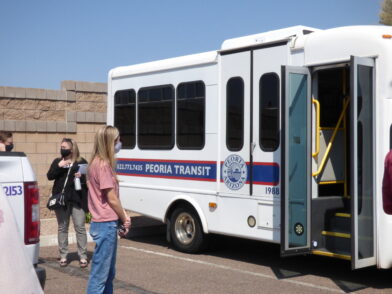
A youth-oriented circulation route was created for the “Peoria on the Go” (POGO) bus, a free-to-use transit circulation system for Peoria which is connected to the greater Phoenix transportation system, by students in Bailey Borman’s CPP 201: Community Impact Lab Fall 2019 course.
20 students from the School of Sustainability helped Peoria identify areas for improvement for its sustainability planning through guiding principles like improving the quality of life in neighborhoods and awareness and participation throughout the community. Based on these recommendations, graduate students from the School of Sustainability designed a community outreach strategy to gather input from Peoria residents on the city’s Sustainable Peoria Plan (City of Peoria). Victoria Caster, Peoria’s Water Conservation Coordinator, notes “This is stuff that trying to do on my own would be quite a struggle, but being able to utilize the resources at ASU and Project Cities, we were able to cast a wider net. It was just a really great resource, and an interesting learning curve for some of the students as well.” (ASU Project Cities)
Two dozen Master of Urban and Environmental Planning students from two courses produced award-winning research and recommendations for Peoria to consider in its implementation of accessory dwelling units as a affordable housing strategy (ASU News).
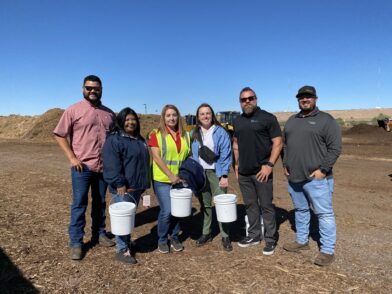
Students across three courses from the Environmental and Resource Management program researched challenging materials in sustainable waste management, such as e-waste, textiles, and fine glass, and recommended strategies for revitalizing Peoria’s solid waste management. Student recommendations led to a new cost-sharing agreement with the City of Phoenix Municipal Recycling Facility to purchase equipment for processing fine glass (Project Report).
Looking forward to a brighter, more sustainable future
Prior to the launch of the partnership, Peoria Mayor, Cathay Carlat, expressed her excitement, saying, “These are all really great projects that are going to make our city better. I certainly appreciate knowing that so much brain power will go into them” (Daily Independent).
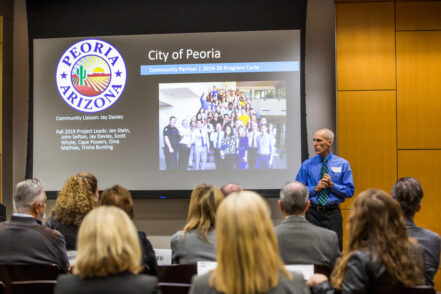
Throughout the five years of the partnership, students have covered a breadth of sustainability challenges, adapting to a rapidly changing community landscape due to COVID, allowing Peoria to adapt to better serve their community and build robust community partnerships. Peoria’s City Manager, Jeff Tyne, expressed his excitement for the future of Peoria, noting “As the City continues to grow and mature, we must face these real-world challenges head-on, and the way forward is together” (Project Cities Impact Report).
Project Cities is a program of the Global Institute of Sustainability and Innovation in Julie Ann Wrigley Global Futures Laboratory at Arizona State University.





